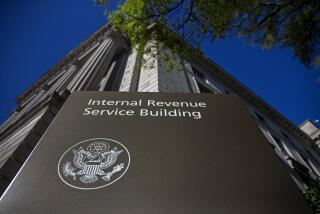Untangling the Income Tax by David F. Bradford (Harvard University: $29.95; 448 pp.)
- Share via
Princeton economist David F. Bradford has written a book that lives up to the promise of its title, and he has done so in a style easily comprehensible to the educated laymen. His book serves three purposes. It is a primer on the economics of taxation; it analyzes the current federal income tax system, and it advances several alternative proposals for reforming the system.
Bradford begins with a short course on the principles of taxation. This material is familiar to professional economists, but much of it will be new to laymen and public officials. For instance, a consumption tax can be made as progressive as an income tax. Progressivity does not require graduated tax rates. Who bears the burden of a tax has little to do with who nominally makes payment to the government. In particular, business does not bear the burden of taxation, so talk of shifting the tax burden from individuals to business, or vice versa, is meaningless.
Bradford contrasts a pure income tax with a pure consumption tax. Income is either consumed or saved. A true income tax is one which is levied at the time when income accrues (not, as is now the case with our capital gains tax, at the time when income is realized). A consumption tax is one which is levied at the time when income is spent; it exempts income which is saved. The current “income” tax system is a hybrid of these two.
Bradford’s central thesis is that features of a consumption tax do not mix well with features of an income tax. Most of the damage results from the inconsistent tax treatment of different investments. Because of this inconsistency, the value of an investment may depend as much on its tax treatment as on the underlying economics. Bradford argues that the resulting distortion of investment decisions and misallocation of investment funds is extremely costly to the economy. He contends that we would be better off with either pure system. A pure income levy would uniformly tax all investments; a pure consumption levy would uniformly exempt them from taxation.
Bradford argues convincingly for a consumption tax based entirely on cash transactions. Its main advantage over an income tax is simplicity. Bradford contends that such a tax could be made as equitable as an income tax and that either would be more equitable and more efficient than the current system.
A consumption tax need not be a sales tax. It may look like a drastically simplified version of the current income tax. The choice between a consumption tax and an income tax is one of the appropriate tax base. A consumption base does not require a flat rate structure. Bradford prefers a graduated system with three or four brackets. A graduated consumption tax would retain some of the saving and investment distortions of the current system, and also some of its inequities. Thus, reading this book has reinforced my own preference for a flat consumption tax.
Bradford has done an admirable job. If public officials were required to take his short course on taxation, we would hear a more intelligent discussion of tax reform. If they were required to read his proposals, we might even get better tax policy.


